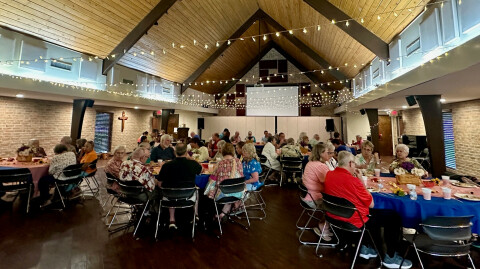TLDR: The Lord’s Prayer is a foundational prayer in our Christian faith.
This week, I saw a meme of a popular singer (and now actress), Taylor Swift, praying. It was amusing, not because I appreciated the objectification of Ms. Swift, instead because of the memories it evoked. I had memories of teenagers singing, loudly, on the return from Mission Trip. That reminded me of how I learned great joy and much about prayers from those sweet souls. The lessons did not stop at that point.
Something interesting about ministry is that we are always learning something new. This is probably true of every profession, however in ministry what I learn impacts my faith. I want to continue working on ways to grow closer to God and sometimes the simplest ways are the easiest. I noticed when he joined the staff that Fr. Pinzon would often close with The Lord’s Prayer. This is such a great practice it brought me back to what I had learned about The Lord’s Prayer both in seminary and in my research when I served as a formation leader.
When I pray this prayer, I use the traditional language, because it is the most familiar to me.
Our Father, who art in heaven,
hallowed be thy Name,
thy kingdom come,
thy will be done,
on earth as it is in heaven.
Give us this day our daily bread.
And forgive us our trespasses,
as we forgive those who trespass against us.
And lead us not into temptation,
but deliver us from evil.
For thine is the kingdom, and the power, and the glory,
for ever and ever. Amen.
This prayer appears once in Matthew and is translated better using the word, debt (ὀφειλήματα)[1], however, I think contextually “trespasses” reminds us of the tradition of the prayer. The word debt evokes credit cards, and while the word is used in Romans 4:4 to discuss what someone is owed, I think the word sins (or even trespasses) gives a greater sense of what is happening. Personally, I owe Jesus more than my credit card could ever be worth. Also, tradition matters: my grandmother taught me to say debts.
A wonderful translation of the prayer from scholar N.T. Wright includes “what we owe,” which feels closer to the truth as well. Wright notes that this prayer is meant to simplify what is done through prayer.
As always, context matters. The Lord’s Prayer is taught to the disciples within what is known as the Sermon on the Mount. Another translocation point comes into play here, Jesus is teaching on piety, however, the word righteousness is a better translation in this verse.[2] Jesus is teaching his disciples about how to be righteous, through prayer using a simple structure.
The Lord’s Prayer answers questions of faith and has traditionally been used to mark a rite of passage for Christians. Specifically, in the sixteenth century, Theologians such as Bohemian Brethren, Desiderius Erasmus, and Martin Luther preferred that Christians could not be confirmed until they could say the Creed, the Ten Commandments, and The Lord’s Prayer. The reformers, including Thomas Cranmer, added this to the Christian Rite of Confirmation.[3] Oddly, this goes against the teachings of the Lord’s Prayer. The very purpose of the prayer is for us to grow closer to God with love and trust.
Sometimes, it is impossible for me, a mere human, to stand in front of God and to know how to ask for what is necessary. These are the moments when I need the Lord’s Prayer, “At its highest, prayer merges into love, as the presence of God becomes so real that we pass beyond words and into a sense of his reality, generosity, delight and grace.”[4]
The origins of the prayer come from a Jewish Prayer.[5] Jesus is taking the familiar and making it new so that those listening know how to connect. The idea that Jesus’ prayer came from Judaism is not surprising given that this is the origin of our Christian faith.
So, whether you look like Taylor Swift, are going to see Amsterdam, or are simply looking for a revitalization for your faith, my prayer for you is that you say the Lord’s Prayer prayer each day and feel God’s influence wash over your life.
For His Sake,
The Rev. Beth Anne Nelson
[1] Danker A Greek English Lexicon of the New Testament and O/ Early Christian Literature 3rd ed. (BDAG) p.743
[2] Yee, J. (2012). Conversations with Scriptures: Matthew. Harrisburg: Morehouse.
[3] Hatchett, M.J. (1980). Commentary on the American Prayer Book. New York: Seabury. pp.555-560
[4] Wright, N.T. (2002). Matthew for Everyone. Louisville: Westminster.
[5] I think this article is a bit extreme, however, some of the arguments are correct. Dart, J. (1988). Scholars say Jesus didn’t Create The Lord’s Prayer. https://www.latimes.com/archives/la-xpm-1988-10-18-mn-4561-story.html#:~:text=The%20Lord's%20Prayer%20appears%20in,however%2C%20in%20Luke%20and%20Matthew.





